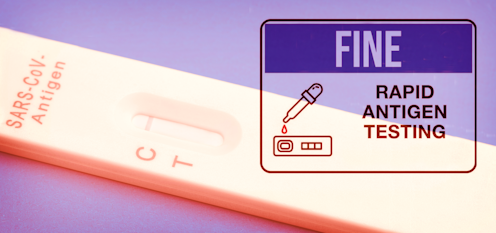The 3 problems with fines for not reporting positive COVID tests
- Written by Richard Holden, Professor of Economics, UNSW

The NSW government this week decreed that anyone returning a positive COVID-19 reading using a rapid antigen test must report their result (through the Service NSW app or website[1]). Failing to do so can result in a $1,000 fine.
The new rule came into effect on January 12 (there will be a one-week grace period). In the first 24 hours more than 80,000 people registered positive tests (recorded since January 1). In one sense that’s a lot. But since we have no idea of the total number of tests taken – let alone the number with a positive result – it’s hard to calibrate.
The fine threat raises a number of questions, with the first being how will the government know if you test positive and don’t record it? On Wednesday, NSW Premier Dominic Perrottet admitted that it would be a hard law to enforce, saying[2]:
there are obviously areas right across the state where there are laws that are harder to enforce than others, this is clearly one that will be harder to enforce, there’s no doubt about it.
Given this, it’s hard to know what the point of the announced penalty is. Indeed, both the economic theory and behavioural research research suggests it will achieve the opposite of its intention.
1. Fines act as a disincentive
Economists view these rules through the lens of the field of “contract theory”.
Rules create incentives that encourage or discourage certain behaviours. In this case, suppose you test positive. If you self-isolate as result, because that’s the right thing to do even without rules, then truthfully reporting the result is of no consequence to you (as long as it’s easy to do, which it is for most people).
But if you wouldn’t isolate, then truthfully reporting the results is of consequence. In NSW you face a $5,000 fine for failing to comply with obligations to self-isolate[3] when diagnosed with COVID-19. Your choice is the low probability of a $1,000 fine for not reporting the result or the higher probability of a $5,000 fine for failing to isolate.
So there’s an individual disincentive to even taking the test at all – which is, after all, optional for most. This means fewer tests will be taken, the opposite of what authorities want.
Read more: It's still not too late to fix the rapid antigen testing debacle. Why the national cabinet decision is wrong and must be reversed[4]
From the perspective of contract theory, therefore, this $1,000 fine is likely to reduce tests by those who are not willing or not able (perhaps because they have to work for financial reasons) to voluntarily isolate.
So you can bet that these folks will be calculating the odds of getting caught. This is the way some people think about parking fines, or thieves think about stealing bicycles. It’s a calculation involving the size of the penalty and the probability of getting caught.
2. Fines can turn off good behaviour
Some scholars, such as Harvard philosopher Michael Sandel, argue the very act of putting a dollar value on things causes people to think of them in a transactional way. It’s no longer “wrong” to park in a no-standing zone, there’s just a kind of fee for it. In other words, fines can destroy civic virtue.
A classic example of this comes from a study[5] by behavioural economists Uri Gneezy and Aldo Rustichini on ways to encourage parents to pick up their children from child-care centres on time.
Parents being late meant staff had to stay behind. The study involved some centres introducing fines to deter late pickups. But the fines actually led to more late pickups. Parents no longer felt so guilty. Being on time was no longer a social norm but a transaction. They could pay to disregard the expectation.
Read more: What to do with anti-maskers? Punishment has its place, but can also entrench resistance[6]
So, too, it might be with this week’s $1,000 fine rule. In the unlikely event of getting caught, some might see the fine as just “the cost of doing business”.
3. Fines can make a mockery of the law
A final consideration about the $1,000 fine for failing to report a positive RAT tests concerns the problem of laws that cannot be enforced. The NSW government concede the new rule will hard to police and is mostly about messaging[7].
“If we didn’t put a fine on it then people would say you’re not taking it seriously,” the minister for customer service said. But this is just turning a law into a bit of a joke. Laws being openly “mocked” damage the rule of law itself.
Getting rules right
These three complementary perspectives all point to the $1,000 fine for failing to report a positive rapid antigen test being a bad idea.
It’s good to make it convenient for people to do the right thing (that’s what the Service NSW app does). It’s good to encourage people to do the right thing. It would be really good if there were lots of RATs available (ideally for free or close to it) so people can have the information to empower and protect themselves, their families and their communities.
This does none of these things. It’s bad to enact a rule that makes a mockery of the law and likely to be counterproductive.
References
- ^ website (www.service.nsw.gov.au)
- ^ saying (www.theage.com.au)
- ^ obligations to self-isolate (www.nsw.gov.au)
- ^ It's still not too late to fix the rapid antigen testing debacle. Why the national cabinet decision is wrong and must be reversed (theconversation.com)
- ^ a study (rady.ucsd.edu)
- ^ What to do with anti-maskers? Punishment has its place, but can also entrench resistance (theconversation.com)
- ^ messaging (www.abc.net.au)
Read more https://theconversation.com/the-3-problems-with-fines-for-not-reporting-positive-covid-tests-174774

















